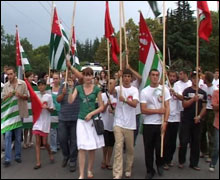
STEINMEIER’S PLAN ON ABKHAZIA: BENIGN INTENTIONS, LIMITED RELEVANCE, BLOCKED BY MOSCOW
Publication: Eurasia Daily Monitor Volume: 5 Issue: 139
By:

Germany distributed its plan for a political settlement of the Abkhazia conflict within the European Union’s Political and Security Committee — which includes 27 delegations — simultaneously with Germany’s presentation of the plan in Tbilisi, Sukhumi, and Moscow.
Drafted by the German Ministry of Foreign Affairs, the document has been more or less cleared by the UN Secretary General’s Group of Friends on Georgia, consisting of the United States, Russia, Britain, France, and Germany which chairs the group at this time. Presenting the document on the Friends’ behalf made it look initially as if Moscow was more or less on board. Russia and the Abkhaz authorities, however, rebuffed the document promptly on its official presentation by the German MFA there, even before Steinmeier had reached Sukhumi and Moscow (see EDM, July 18).
Brusquely at first and then more politely, Moscow has basically turned down the German plan despite its far-reaching concessions to Russian interests.
The document accepts the continuation of Russia’s “peacekeeping” operation. This can not be surprising, considering the German MFA’s support for Russian “peacekeeping” in Moldova and Georgia in the name of “stability” since Steinmeier became minister.
It is, however, surprising that the document fails to mention Georgia’s territorial integrity and internationally recognized borders. Such mentions are standard at least pro forma in international documents. Only Russia has ceased even that lip service since the beginning of this year, practically de-recognizing Georgia’s integrity and borders (see EDM, July 11). The omission in the German plan is a striking one and Steinmeier hastened to repair it, at least in words, in Georgia (though not, apparently, at the two other stops on his tour). Emerging from the talks with President Mikheil Saakashvili, Steinmeier found it necessary to add several times during the briefing that Germany respects Georgia’s territorial integrity (Georgian Public TV, July 18).
Surprisingly again for a document under nominal UN aegis, the German plan abandons the usage “Abkhazia, Georgia,” which is standard in UN and other international documents and is designed to imply that Abkhazia is within Georgia. Instead, the German document refers simply to “Abkhazia,” whether inadvertently or otherwise. The document implicitly accepts the fiction that Georgia and Abkhazia are “the parties to the conflict.” This usage, admittedly, has become standard in many international documents, to avoid confronting Russia’s responsibility as party to the conflict and its orchestrator. But the German plan was supposed to change something in this flawed process, not to reinforce those flaws.
The plan consists of three phases, of which the first is the most elaborately presented. Here, “the parties” (Georgia and Abkhazia) would exchange declarations on non-resumption of hostilities. After this, “drawing on existing bodies,” Tbilisi and Sukhumi would establish a framework for direct high-level dialogue, in which the United Nations Observer Mission in Georgia (UNOMIG) and the UNSG’s Group of Friends would serve as facilitators. This is a marginal improvement on the existing situation, in which Russia is the “facilitator.”
Given Russia’s veto power over UNOMIG and the Group of Friends, however, it seems difficult to see how the proposed change could unblock the negotiating process. The plan would allow for any further internationalization “if the parties so agree” — i.e., subject to an Abkhaz veto, without Russia having to cast its own veto.
As regards international peacekeeping (other than Russian), “Both sides will consider a possible deployment of international police.” This leaves the issue again dependent on Russian and Abkhaz consent. Moreover, “Should a threat to security arise, existing mechanisms would be implemented to avoid a military confrontation.” This provision also maintains Russian control on the ground.
The plan enshrines the “general acceptance of the right of return of all internally displaced persons (IDPs) and refugees to Abkhazia, as well as the obligation to safeguard the full range of their rights.” On the other hand, however, “the parties [Tbilisi and Sukhumi] will agree on the modalities of their return.” This leaves wide scope for Abkhaz or Russian stonewalling, whether overtly or through conditionalities.
The document envisages “Open economic opportunities for the Abkhaz to trade with Georgian and international partners.” This is a two-edged sword, which Moscow will undoubtedly construe as authorizing an expanded Russian economic presence in Abkhazia. The plan’s first phase is expected to be implemented within 15 months.
In the second phase, Germany would host an International donors’ conference with the participation of the EU, UN, OSCE, international financial organizations, Russia, and the United States. Donors would pledge funds for reconstruction of “Abkhazia and areas neighboring the zone of conflict” (those latter areas being apparently the Georgian-controlled districts along the demarcation line).
During this phase, refugees and IDPs would continue returning to their homes in Abkhazia. “The parties,” local communities, and NGOs are to cooperate in creating adequate conditions for living, schooling, the administration, and inter-ethnic cooperation there. Judging from contextual remarks, the return program is initially limited to the Gali and Ochamchire districts.
In the third and final phase, a working group would be created to draft the “political status of Abkhazia” [no mention of Georgia]. The group would consist of “the parties,” “assisted by international facilitators and guarantors.” The UN Security Council would ultimately “endorse the status agreement and monitor its implementation.” A follow-up conference of international donors would then be called to provide further support for reconstruction.
The concept of “guarantors” appears here for the first time in the document and is not defined, whether in itself or in relation to UNSC “monitoring.” This strengthens the impression that the document is only intended as a broad framework, with ample room to take Georgian views more carefully into account and change the unacceptable situation on the ground. This scope for improvement may yet become the German plan’s saving grace.
(German MFA, “Georgia/Abkhazia: Elements for a peaceful settlement of the conflict,” document distributed at the EU Council’s Political and Security Committee meeting, July 11).




